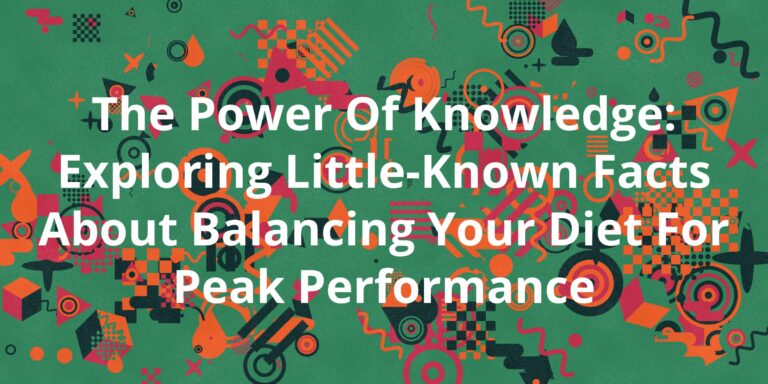Introduction:
Balanced eating is the key to unlocking your full potential. It is not just about maintaining a healthy weight or preventing chronic diseases like diabetes, heart disease, and cancer. Balanced eating can help you improve your physical and mental health, boost your energy levels, and enhance your overall quality of life. In this article, we will explore the benefits of balanced eating and provide tips for achieving it in your daily life.
The Importance of Balanced Eating:
Balanced eating means consuming a variety of nutrient-dense foods from all food groups in appropriate amounts. This includes fruits, vegetables, whole grains, lean proteins, and healthy fats. When you eat a balanced diet, your body gets the nutrients it needs to function properly, which can lead to improved health outcomes.
Benefits of Balanced Eating:
1. Improved Physical Health: A balanced diet can help you maintain a healthy weight, reduce your risk of chronic diseases like heart disease and diabetes, and improve your overall physical health.
2. Enhanced Mental Health: Eating a balanced diet can also have positive effects on your mental health. It can help reduce stress, anxiety, and depression, and improve your cognitive function.
3. Increased Energy Levels: When you eat a balanced diet, you are more likely to have sustained energy levels throughout the day. This can help you be more productive and focused.
4. Better Sleep Quality: Eating a balanced diet can also help you get better quality sleep, which is essential for overall health and well-being.
Tips for Balanced Eating:
1. Eat a Variety of Foods: To ensure that you are getting all the nutrients your body needs, it’s important to eat a variety of foods from all food groups. This includes fruits, vegetables, whole grains, lean proteins, and healthy fats.
2. Choose Nutrient-Dense Foods: When choosing foods, look for those that are high in nutrients like vitamins, minerals, and fiber. These foods will keep you feeling full longer and provide your body with the nutrients it needs to function properly.
3. Limit Processed Foods: Processed foods are often high in added sugars, sodium, and unhealthy fats. Try to limit your consumption of these foods and opt for whole, natural foods instead.
4. Practice Mindful Eating: Pay attention to how you feel while you eat, and stop eating when you’re full. This can help you avoid overeating and make more conscious food choices.
5. Stay Hydrated: Drinking plenty of water is essential for overall health and well-being. Aim for at least 8 glasses of water per day.
Conclusion:
Balanced eating is the key to unlocking your full potential. By consuming a variety of nutrient-dense foods from all food groups in appropriate amounts, you can improve your physical and mental health, boost your energy levels, and enhance your overall quality of life. Remember to choose nutrient-dense foods, limit processed foods, practice mindful eating, stay hydrated, and eat a variety of foods to achieve balanced eating.



